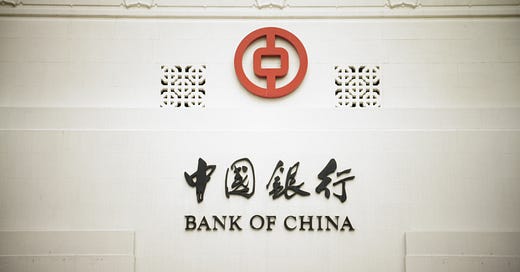Welcome to a new edition of Contention -- this will take about five minutes to read, and there’s no paywall here. We’d still love to have you as a subscriber, though!
Make sure to follow us on Substack Notes and Twitter (as long as it’s here).
For years we’ve read about sweeping crackdowns in China on corruption, antitrust violations by tech platforms, and shadow banking. Now authorities have extended this campaign with a bold new reorganization of the state’s main financial regulators while at the same time opening investigations into at least 20 executives in recent weeks – with more oversight to come.
How and why this is happening offers important lessons in China’s economy and governance, as well as a glimpse into the country’s ambitions. Beijing is laying out an alternative to “too big to fail” by reigning in speculative finance firms, wealth management products, and trusts that have blurred the lines between state and capital.
What makes the latest crackdown different: for the first time, enforcement has focused on state-owned enterprises, some of the most critical institutions for China’s economy. In March, Bank of China chairman Liu Liange announced his resignation amid an anti-corruption investigation by the Communist Party’s Central Commission for Discipline Inspection (CCDI) – the party’s most important watchdog. The state-owned Bank of China is the fourth largest bank in the world, and the probe marks the first time in decades that officials have investigated a top executive at one of the country’s “big four” banks.
More scrutiny focused on Li Xiaopeng, former chairman of state-owned Everbright Group, for “disciplinary violations.” Everbright had teamed up on construction projects with property developer Evergrande, which defaulted on $1.2 billion in debt in late 2021. State anti-corruption investigators have reportedly taken some Everbright staff away for questioning.
There was even worse news for Wang Bin. In January, officials charged the 64-year-old former head of China Life Insurance Company with accepting bribes and concealing overseas deposits. The state-owned company provides around 317 million individual and group life insurance policies. Famous tech broker and billionaire Bao Fan might too be under investigation – he hasn’t been heard from in weeks.
The crackdown on risky finance and corruption goes back to 2017 when the party reigned in risky borrowers, following years of development-focused loose financial policy. The Party focused first on big conglomerates pursuing ambitious expansion plans.
The state looked into HNA Group, a diverse company with global stakes in aviation, tourism and logistics – and forced it to unwind and sell off its airline assets. Authorities arrested Wu Xiaohui too, the chairman of insurance and financial services giant Anbang, on fraud and embezzlement charges after he disguised short-term investment instruments as insurance. He received 18 years in prison, and the government liquidated and restructured Anbang, an expensive, complex undertaking.
“It is necessary … to increase the punishment of corruption in areas such as finance, state-owned enterprises, and grain purchases and sales, where power is concentrated, capital-intensive, and resource-rich,” the CCDI stated in February. “As the top priority, seriously investigate and deal with the corruption of people around leading cadres who use their influence for personal gain.”
The Commission left its ultimate motivations unmistakable: “Intensify the investigation and punishment of new types of corruption and hidden corruption such as ‘shadow shareholders, and resolutely cut off the link between power and capital.”
Severing that link doesn’t just mean targeting specific corrupt or risky firms and individuals, it has prompted a large-scale reorganization of financial regulation in the world’s largest economy.
At this year’s “Two Sessions” the party scrapped its Financial Stability and Development Committee – which was under the State Council – and announced the return of the Central Financial Work Commission (CFC), a stronger and more centralized party agency which previously existed between 1998 and 2003 following the Asian financial crisis.
“Leninist institutions provided China's politicians with a reserve capacity for responding to perceived organizational crises and for innovating economic regulation,” political scientist Sebastian Heilmann wrote in a 2005 review of the CFC. Heilmann faulted the Commission for , failing to introduce “market-driven” incentives for top financial executives. However, “Leninist means of control were conducive to establishing centralized supervision and more uniform regulation.”
The party assigned a separate entity, named the National Financial Regulatory Administration, the job of regulating China’s $57 trillion financial industry, minus the securities sector, which will fall to a different administration – both under party supervision. The party plans to complete the reorganization by 2024 and achieve “centralized and unified leadership.”
Alongside this attenuation of private financial power comes new investment in state-owned firms, stationed in the key sectors of the economy: defense, infrastructure, communications, natural resources, and construction. While Americans are barred by their government from investing in them, shares in state-owned telecom companies have surged on Hong Kong’s stock market.
By 2030 state spending with these firms will have a projected economic impact of $220 billion. The Communist Party is setting up a new sci-tech ministry to supervise this sector and mobilize resources to overcome bottlenecks imposed by U.S. restrictions on technological exports.
China is cautious about giving the impression that it is doing away with private firms: the Chinese economy relies on them. Explosive growth since the 1980s necessitated expansion of the financial sector, with greater complexity following. State-owned banks remained dominant, but new firms with more diverse structures and unique credit instruments -- like peer-to-peer lending platforms -- proliferated. Executives at these firms got rich, and products got riskier and more complicated, a price the party was willing to pay for a dramatic improvement in overall wealth and quality of life.
But now the party-state has decided it’s time to remind those companies and their wealthy managers who has always been in charge. This year’s extraordinary actions and reforms ensure that that authority will remain unquestioned.
Disclaimer
Our only investment advice: Long ebony steel robots.
Contact us with questions, perspectives, suggestions, or stories we might have missed.




